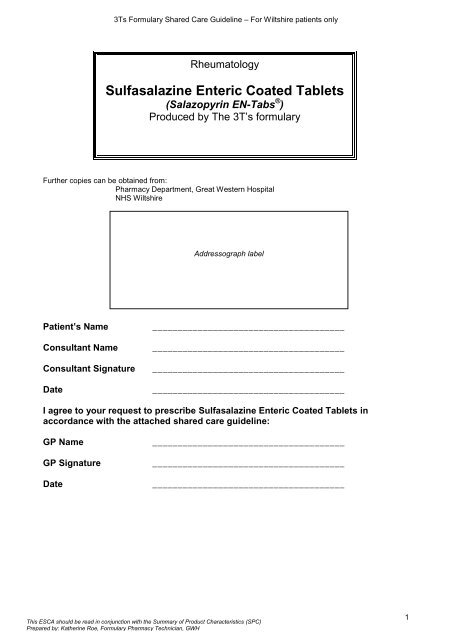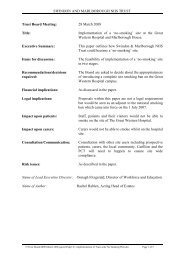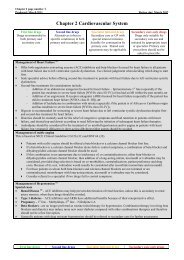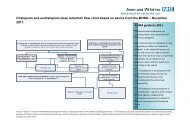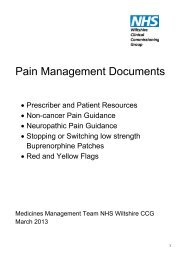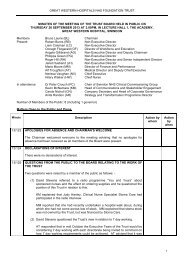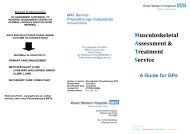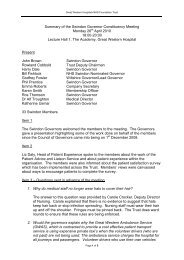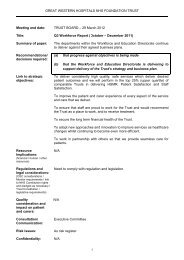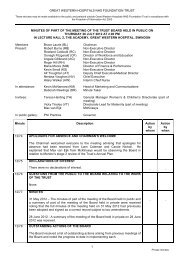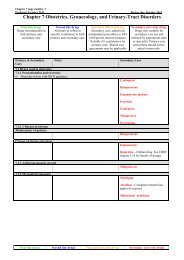Sulfasalazine - The Great Western Hospital
Sulfasalazine - The Great Western Hospital
Sulfasalazine - The Great Western Hospital
You also want an ePaper? Increase the reach of your titles
YUMPU automatically turns print PDFs into web optimized ePapers that Google loves.
3Ts Formulary Shared Care Guideline – For Wiltshire patients only<br />
Rheumatology<br />
<strong>Sulfasalazine</strong> Enteric Coated Tablets<br />
(Salazopyrin EN-Tabs ® )<br />
Produced by <strong>The</strong> 3T’s formulary<br />
Further copies can be obtained from:<br />
Pharmacy Department, <strong>Great</strong> <strong>Western</strong> <strong>Hospital</strong><br />
NHS Wiltshire<br />
Addressograph label<br />
Patient‛s Name<br />
Consultant Name<br />
Consultant Signature<br />
Date<br />
______________________________________<br />
______________________________________<br />
______________________________________<br />
______________________________________<br />
I agree to your request to prescribe <strong>Sulfasalazine</strong> Enteric Coated Tablets in<br />
accordance with the attached shared care guideline:<br />
GP Name<br />
GP Signature<br />
Date<br />
______________________________________<br />
______________________________________<br />
______________________________________<br />
This ESCA should be read in conjunction with the Summary of Product Characteristics (SPC)<br />
Prepared by: Katherine Roe, Formulary Pharmacy Technician, GWH<br />
1
3Ts Formulary Shared Care Guideline – For Wiltshire patients only<br />
<strong>Sulfasalazine</strong> Enteric Coated Tablets<br />
(Salazopyrin EN-Tabs ® ) (TLS Amber)<br />
for the treatment of rheumatoid arthritis, psoriatic arthritis and sero-negative arthritis<br />
AREAS OF RESPONSIBILITY FOR THE SHARING OF CARE<br />
This shared care agreement outlines how responsibility for prescribing <strong>Sulfasalazine</strong> Enteric Coated Tablets<br />
might be shared between specialist and general practitioner (GP). GPs are invited to participate. If the GP<br />
is not confident to undertake these roles, then he or she is under no obligation to do so. In such an event,<br />
the total clinical responsibility for the patient for the diagnosed condition remains with the specialist. If a<br />
specialist asks the GP to prescribe this drug, the GP should reply to this request as soon as practicable.<br />
Sharing of care assumes communication between the specialist, GP and patient. <strong>The</strong> intention to share care<br />
is usually explained to the patient by the doctor initiating treatment. It is important that patients are consulted<br />
about treatment and are in agreement with it.<br />
<strong>The</strong> doctor who prescribes this medication legally assumes clinical responsibility for <strong>Sulfasalazine</strong> Enteric<br />
Coated Tablets and the consequences of its use.<br />
RESPONSIBILITIES and ROLES<br />
Specialist responsibilities<br />
1 Complete initial FBC, LFT and renal function tests.<br />
2 Initiate treatment and prescribe escalation dose for at least one month.<br />
3 Discuss the benefits and side effects of treatment with the patient, including reporting immediately any signs of<br />
bone marrow suppression (bleeding/bruising etc).<br />
4 Ensure compatibility of sulfasalazine with other concomitant medication.<br />
5 Ask the GP whether he or she is willing to participate in shared care, and discuss the shared care arrangement<br />
with the patient & obtain their consent.<br />
6 Supply GP with summary within 14 days of a hospital out-patient review or in-patient stay.<br />
7 Review the patient's condition and monitor response to treatment at least annually or as deemed clinically<br />
necessary.<br />
8 Give advice to the GP on future monitoring, dosage adjustment and when to stop treatment.<br />
9 Report adverse events to the MHRA & GP.<br />
10 Ensure that clear backup arrangements exist for GPs to obtain additional advice and support should they need<br />
it.<br />
General Practitioner responsibilities<br />
1 Reply to the request for shared care as soon as practicable.<br />
2 Prescribe medicine at the dose recommended by the specialist<br />
3 Ensure compatibility of sulfasalazine with other concomitant medication.<br />
4 Undertake monitoring as per schedule on page 4 and refer to the specialist for advice on dosage adjustment.<br />
5 Refer promptly to specialist when any loss of clinical efficacy is suspected (e.g. worsening of disease-related<br />
symptoms, new symptoms suggestive of disease recurrence or progression) or intolerance to therapy occurs.<br />
6 Report to and seek advice from the specialist on any aspect of patient care that is of concern to the GP and<br />
may affect treatment.<br />
7 Stop treatment on the advice of the specialist.<br />
8 Report adverse events to the specialist and MHRA.<br />
Patient's role<br />
1 Attend all appointments with GP and specialist, including appointments for blood tests and other monitoring.<br />
2 Report to the specialist or GP if he or she does not have a clear understanding of the treatment.<br />
3 Share any concerns in relation to treatment with medicine.<br />
4 Inform specialist or GP of any other medication being taken, including over-the-counter products.<br />
5 Report any adverse effects to the specialist or GP whilst taking the medicine.<br />
BACK-UP ADVICE AND SUPPORT<br />
Contact details Telephone No. Bleep: Email address:<br />
Specialist (Rheumatology):<br />
Dr E Price – Consultant Rheumatologist 01793 604314 2112 Elizabeth.Price@gwh.nhs.uk<br />
Dr L Williamson – Consultant Rheumatologist 01793 604318 1263 Lyn.Williamson@gwh.nhs.uk<br />
Dr D Collins – Consultant Rheumatologist 01793 604317 David.Collins@gwh.nhs.uk<br />
GWH Medicines Information 01793 605029 medinfo@gwh.nhs.uk<br />
Rheumatology Team – Osprey Department 01793 604323<br />
This ESCA should be read in conjunction with the Summary of Product Characteristics (SPC)<br />
Prepared by: Katherine Roe, Formulary Pharmacy Technician, GWH<br />
2
SUPPORTING INFORMATION<br />
3Ts Formulary Shared Care Guideline – For Wiltshire patients only<br />
Summary of condition/Licensed indications<br />
This guideline covers use in Rheumatoid arthritis, psoriatic arthritis* & sero-negative arthritis* (e/c<br />
tablets only).<br />
Use in Ulcerative colitis and Crohns Disease is not covered within this guideline. For details of<br />
dosing in these indications please contact the appropriate specialists.<br />
If used outside of these indications the specialist should liaise with the GP and provide background<br />
literature, before the appropriateness of a shared care agreement is assessed.<br />
*unlicensed use in psoriatic arthritis and sero-negative arthritis<br />
Expected / established place in local treatment pathway<br />
Treatment of arthritis which has failed to respond to non-steroidal anti-inflammatory drugs (NSAIDs.)<br />
Aim of treatment is to prevent damage to joints and slowly reduce joint swelling and stiffness.<br />
Dosage and administration<br />
Rheumatoid arthritis and related conditions:<br />
Starting dose is 500mg OD increasing stepwise to 500mg QDS or 1g TDS, according to response<br />
and tolerance.<br />
Administer with or immediately after food.<br />
Tablets should not be crushed or broken.<br />
<strong>The</strong>rapeutic effect may only be evident after 6 weeks of treatment. If no improvement within six<br />
months consider additional agents.<br />
More cost effective to prescribe as Salazopyrin EN Tablets.<br />
Contra-indications and precautions for use<br />
Contraindicated in known hypersensitivity to sulfasalazine, metabolites of sulfasalazine or any of the<br />
excipients.<br />
Contraindicated in children under 2 years of age<br />
Contraindicated in patients with porphyria<br />
Oral sulfasalazine inhibits the absorption and metabolism of folic acid and may cause folic acid<br />
deficiency<br />
Use with caution in patients with severe allergies or bronchial asthma<br />
<strong>Sulfasalazine</strong> should not be used in patients with impaired hepatic or renal function or with blood<br />
dyscrasias unless benefit outweighs risk.<br />
See SPC for full list of contraindications and precautions for use.<br />
Side-effects<br />
If a patient is going to experience an adverse effect with sulfasalazine it will often occur within the first six<br />
weeks of treatment<br />
Very Common<br />
Common<br />
Uncommon<br />
Nausea, gastric upset<br />
Leucopenia, insomnia, taste disorders, tinnitus,<br />
headache, dizziness, conjuctival & sclera injection,<br />
cough, pruritis, rash, proteinuria, fever<br />
Thrombocytopenia, depression, vertigo, dysponea,<br />
alopecia, urticaria, facial oedema, elevation of liver<br />
enzymes<br />
Reversible oligospermia is also seen.<br />
May colour urine & other secretions orange.<br />
May stain soft contact lenses.<br />
Please note that the following convention has been used for the classification of side-effects: very common<br />
( 1/10), common (≥ 1/100 to
3Ts Formulary Shared Care Guideline – For Wiltshire patients only<br />
Monitoring<br />
Parameter Frequency of monitoring Action<br />
(adjustment and referral back to hospital)<br />
Full Blood Count (incl.<br />
differential white cell<br />
count), liver function<br />
tests and assessment<br />
of renal function (incl.<br />
urinalysis)<br />
Before initiation of treatment and<br />
monthly during the first 3 months of<br />
therapy, thereafter monitoring should be<br />
completed as clinically indicated but<br />
normally at least every 3-6 months.<br />
If new fall below normal range or<br />
persistent downward trend<br />
Drug Interactions<br />
Reduces absorption of digoxin resulting in non-therapeutic serum levels<br />
Hypoglycaemia has occurred in patients receiving sulphonamides<br />
Patients receiving hypoglycaemic agents should be closely monitored<br />
Care needed when co-prescribing with agents that affect the bone marrow.<br />
See SPC for full list interactions<br />
Cost<br />
Salazopyrin EN Tablets 500mg x 112: £8.43<br />
References<br />
(NHS Prescription Services 12/06/2012)<br />
Electronic Medicines Compendium. Summary of Product Characteristics. Salazopyrin EN Tablets<br />
(Sulfazalazine EC Tablets)<br />
http://www.medicines.org.uk/EMC/medicine/10722/SPC/Salazopyrin+En-Tabs<br />
Author<br />
Katherine Roe, Formulary Pharmacy Technician, GWH<br />
Date written August 2012<br />
Date of review December 2015<br />
This ESCA should be read in conjunction with the Summary of Product Characteristics (SPC)<br />
Prepared by: Katherine Roe, Formulary Pharmacy Technician, GWH<br />
4


